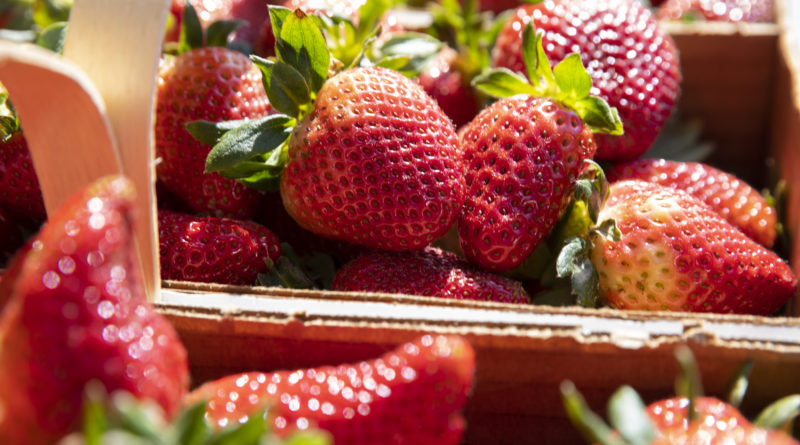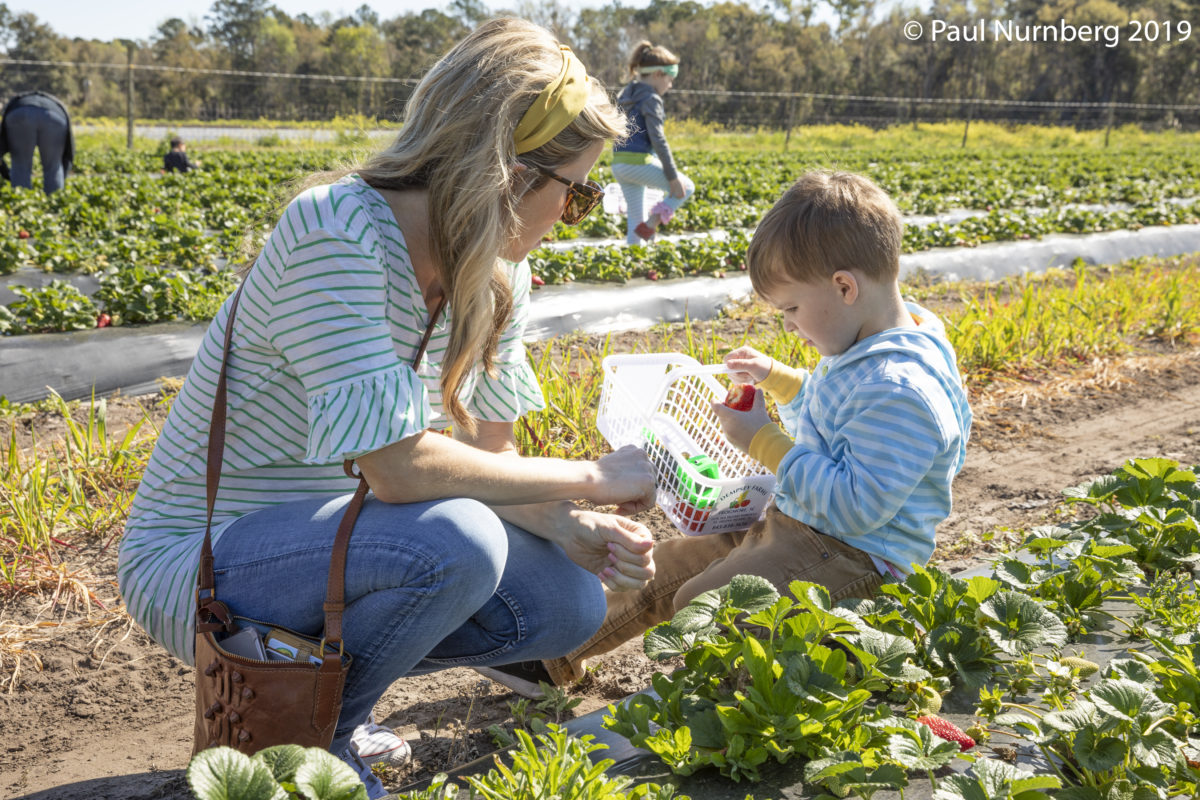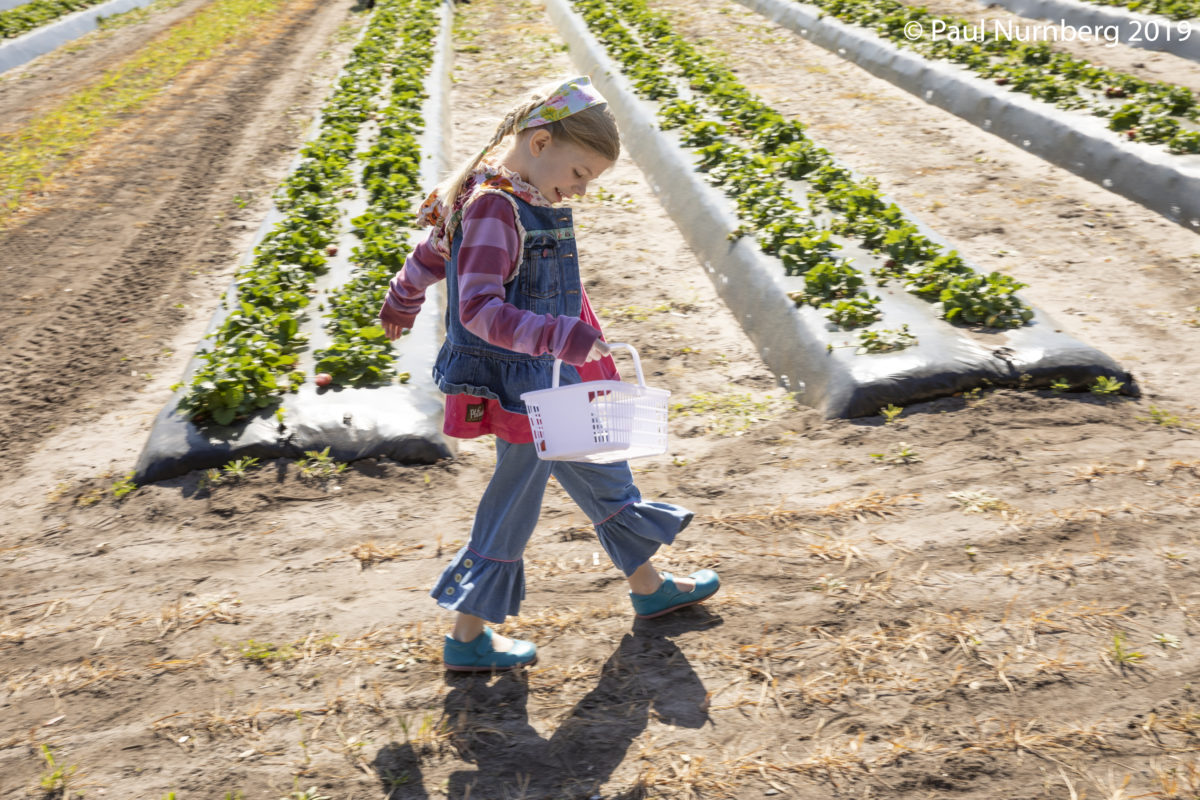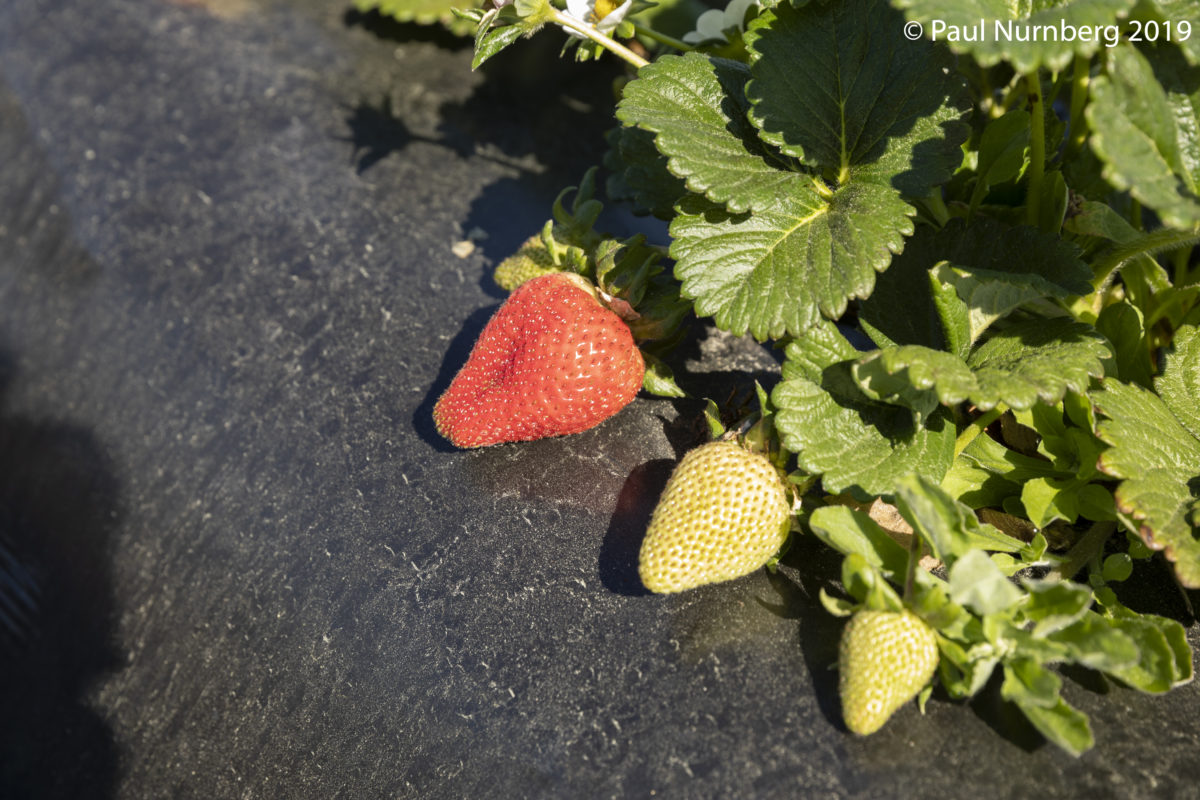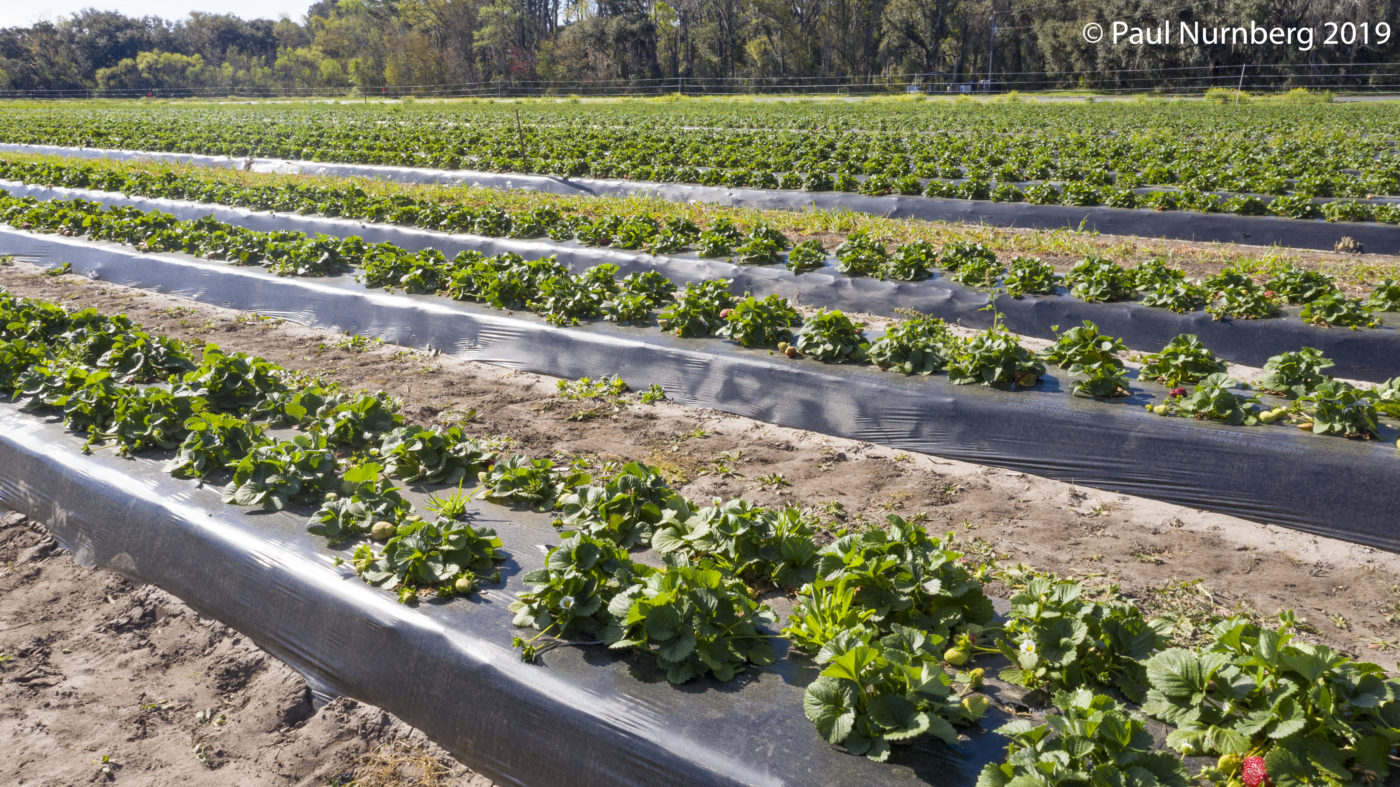DAVEY DEMPSEY: Dempsey U-Pick Fields Beaufort’s First Farmers Market Way Before It Was A Thing
story by LISA ALLEN photo by PAUL NURNBERG
The carloads begin arriving from Bluffton and Hilton Head at Dempsey’s U-Pick fields on St. Helena Island even before they open on picking days.
“A lot of our business comes from Bluffton and Hilton Head,” said Davey Dempsey, 60, the current farmer in the family. “Most of them are from Sun City.”
The number of people could fill a bus, but Dempsey noted that Sun
As the day progresses, more locals arrive as part of their daily errands. Dempsey knows nearly everyone.
“By the end of the day, we’ll have 350 people through here and my voice is gone,” he said.
Amid the ever-popular strawberry season, Dempsey greets each group and gives them a white plastic basket for them to fill.
“
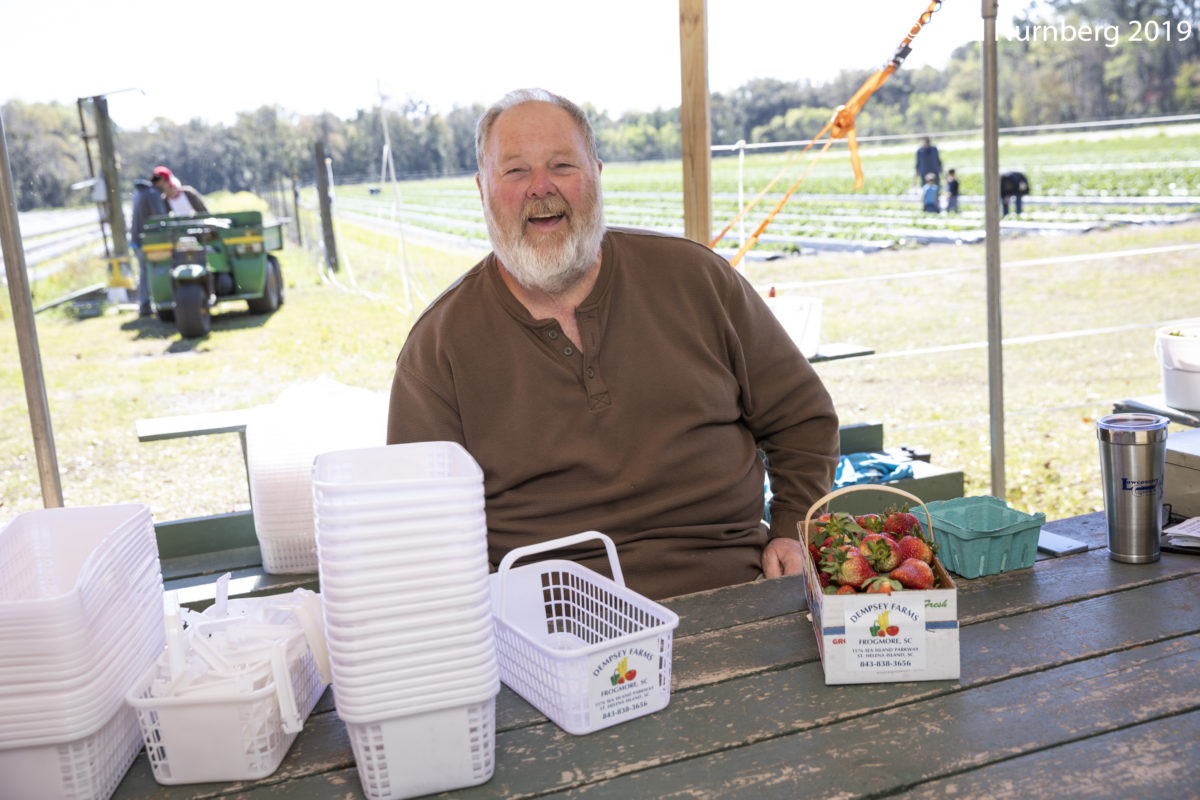
He plants three acres of berries, 5,000 plants, but might increase it next year. They don’t use any pesticides on the plants. “There are too many young mouths eating them as they pick,” he said.
Dempsey’s Farms have been an institution on St. Helena for generations. The U-pick farm opened about 40 years ago, but farming was nothing new to the Dempsey family. Davey Dempsey was only 6 when he started working on the farm. His father, Davis, now 83, wasn’t much older when he started. The senior Dempsey still works every day.
Dempsey’s farming roots are deep. Both of his great-grandfathers were farmers. His grandfather moved Beaufort County after World War I to be a caretaker at Cherokee, then moved to Coffin Point in 1936. Dempsey’s father was born at Cherokee Farm next to today’s Habersham. He later farmed and raised cows at Coffin Point, eventually accumulating 275 acres on St. Helena. They’ve sold some land, leaving 125 acres where they grow strawberries and nearly a dozen different vegetables. “If you think about it, we were the first farmers market in Beaufort County,” Dempsey said.
Dempsey hands out a list of harvesting dates that his father developed years ago. Weather patterns have accelerated the seasons, but the card provides a guideline. For example, the card says strawberry season starts the first week of April, but these days they’re ripe and ready in mid-March.
As the Dempseys well know, farming isn’t an exact science. They were open on a recent sunny Wednesday, but wouldn’t open again until Saturday. Then, they were picked clean in just three hours.
Each morning, Dempsey surveys the fields to determine how much is ripe and then sets the picking hours, both for his bread-and-butter U-pick customers and his commercial accounts in Charleston and Beaufort.
“I gauge it on how long it takes my pickers to get enough berries for the Chocolate Tree. If it takes them longer than usual, that means the fields are getting picked clean,” he said. He’ll wait another day or two to open for U-pick to give them time to ripen. He doesn’t want to frustrate people who travel out to the farm and leave with less than they wanted.
Dempsey Farm has been part of the local fabric for decades, but that might not always be the case.
“We want to remain a family farm,” Dempsey said. “But it is harder and harder to make a living farming. Between taxes and maintaining the property, it’s tough to clear a profit.”
A report published last year by the U.S. Department of Agriculture found that 51 percent of the total value of American farm production in 2015 was generated by large farms with at least $1 million in sales each year. In 1991, that number was 31 percent.
“Agricultural production has shifted to much larger farming operations over the last three decades, even as the number of very small farms grows,” the report said. “Consolidation of acreage and production has been persistent, widespread, and pronounced in crop production.”
In 2012, 36 percent of all cropland was on farms with at least 2,000 acres of cropland, up from 15 percent in 1987, the report said. The midpoint for cropland acreage, at which half of all cropland is on larger farms and half is on smaller farms, nearly doubled from 650 acres in 1987 to 1,201 acres in 2012.
Rather clinically, the report points out the advantages and disadvantages of larger and larger farms.
“Changes in the sector’s organization have accompanied and facilitated major improvements in agricultural productivity, allowing the United States to substantially increase agricultural production while reducing the amount of land, labor, and capital devoted to agriculture,” the report said. “At the same time, largescale farming operations are said to force small farms out of business, damage the viability of rural communities, reduce the diversity of agricultural production, and create environmental risks through their production practices.”
Daily facebook posts tell eager customers when they’ll be open next or if they’re closing early. “My daughter takes care of that, said Dempsey. Mary Kathryn, 32, works in IT in Charleston, but still has a hand in the family business.
There is hope for another generation of Dempsey Farm U-Pick. Dempsey’s son, Warren, 30, is showing interest in the farm, helping his father with contracts with Boone Hall and other locations in Charleston.
Not only does the farm provide fresh produce for pickers and local businesses, but it also helps those in need, too.
Dempsey Farm contributes tons, literally tons, of food to Second Helping, a nonprofit group that collects food from growers and grocers and gives it to food pantries around Beaufort County. Last year, Second Helpings collected 6 tons of produce from Dempsey Farms to distribute to struggling families.
On a smaller scale, an older couple brought up two plastic baskets filled with strawberries and Dempsey waved them away. They thanked him and headed to their car. “They’re former employees,” he explained, needing to say nothing more.
Try that at a corporate farm.


